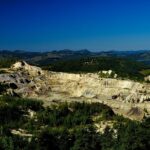Millennial Potash Corp. (OTC PINK: BMGCF) (TSXV: MLP) (FSE: X0D) has entered the almost $30 billion global potash industry after acquiring the Banio Potash Project (Banio) in Gabon, West Africa. It’s a shallow, high-grade, and drill-proven multi-billion tonne potash target previously owned by Equatorial Potash that will now see its development accelerated. Millennial Potash, formerly Black Mountain Gold USA Corp., may have a familiar ring to it and its management team may be familiar to many investors in the mining industry as well. If you were part of the $490-million buyout of Millennial Lithium by Lithium Americas where early investors realized +1,300% returns, then you’ll recognize the Millennial name and Millennial Potash’s seasoned M&A and mining development professionals.
Millennial’s executives have an uncanny ability to identify and acquire promising low-cost resource projects, then generate overwhelming funding for the project, build the asset into an attractive advanced-stage property, and finally successfully exit the project and deliver incredible returns for those investors who enjoyed the journey. Millennial Potash’s Chairman of the Board, Farhad Abasov, will again team up with Graham Harris, Director and Senior VP-Capital Markets at Millennial, Dr. Peter J. MacLean, Ph.D., P.Geo., Director and Senior VP-Exploration at Millennial and Max Missiouk, CPA, CMA, the Chief Financial Officer at Millennial. The group recently developed and successfully exited one Millennial, and now the skilled executives are embarking on a new Millennial.
They are trading in lithium for potash. So, the obvious question for many is—what is potash? Well, with an ever-growing global population and with constantly changing geopolitics and climate concerns, food and water security has become a major topic among governments, the agriculture sector, and even at the World Economic Forum. Fertilizers provide essential nutrients to the land, which in turn, increases productivity for growers. Potash is the common name given to a group of minerals and chemicals that contain potassium (K), which is a basic nutrient for plants and an important ingredient in fertilizer. Potash is used primarily in fertilizers (approximately 95%) to support plant growth, increase crop yield and disease resistance, and enhance water preservation.
Most potash is produced as potassium chloride (KCl); however, it is often measured and referred to in terms of potassium oxide (K2O) equivalence for consistency because deposits can have different percentages of potassium. KCI is also called muriate of potash (MOP), which is the most highly valued and widely used potassium fertilizer in the world. Potash is a potassium-rich salt that is mined from underground deposits formed from evaporated sea beds millions of years ago. And it just so happens that the Banio Project is sitting on billions of tonnes of potash.
To lead the way in this new endeavor, Millennial Potash has tapped mining and exploration professional, Jason Wilkinson, M.Sc., as its Chief Executive Officer. Wilkinson has 25 years of mining and exploration experience and has spent the last 15 years in the potash industry specifically. The company says his vast experience will be instrumental in expediting the development program at Banio, and he joins a Millennial team that has years of potash industry experience having founded, developed, and successfully exited large potash projects, including Allana Potash and Potash One.
This group recently raised an additional $3.5 million in a private placement which brings Millennial’s cash on hand to over $6 million. These funds will enable Wilkinson to accelerate the development program at Banio, including its initial Phase 1 exploration program. Drill equipment is already on-site and camp infrastructure is in place which will allow for rapid start-up.
Millennial has already acquired 25% of the 1,238 square kilometer Banio Project with an option to acquire up to 100% of the project. Banio is located along the coast of Gabon on the border with the Republic of Congo within the potash-rich Congo Evaporite Basin (Basin). Banio is 70 kilometers north of Kore Potash’s world class Kola, Dougou and DX potash deposits, all of which are located within the same sedimentary horizons of the Basin—an area where some of the world’s highest graded potash is being identified. Millennial says that extensive oil and gas exploration identified potash bearing seams in numerous exploration wells and widespread seismic surveys in the Banio Project area suggest strong continuity of the geology from the Republic of Congo.
According to the company, Banio is extremely promising because previous drilling has intersected significant widths of potash mineralization that may be amenable to low-cost solution mining. In addition, the project has good infrastructure, including a local port city, major airport, roadways and waterways nearby leading to the project, and an exploration camp, drill rigs, and historic drill core on site. Millennial Potash would have a significant cost advantage over its competitors in the industry due to Banio’s proximity to major potash markets—shipping time, particularly to Brazil and the Asian Markets is much less than other suppliers enjoy.
Given previous exploration results, the Banio Potash Project offers an ideal opportunity for the Millennial team. Historic drilling intersected significant potash‐rich horizons from 230 meters to 520-meter depths along with continuous carnallite and sylvinite seams ranging from 1.0 meter to 28.8 meters thick. Previous exploration done by Infinity Lithium (previous owner of Equatorial) and its predecessor, Plymouth Minerals, in 2017-2018, has shown there is a high degree of continuity in stratigraphy, deposit style and mineralization along the Basin. In 2018, when reporting its maiden JORC resource, Infinity stated that the company and its consultants are confident in the high degree of similarity between potash mineralization at the Banio Potash Project and that seen within the Basin in the Republic of Congo. This similarity includes mineralization types (sylvinite and carnallite), depths (shallow with sylvinite starting from 250 meters below surface) and large scale (billions of tonnes).
A three-hole potash-specific drill program, including wells BA-001, BA-002 and BA-003 was completed by Infinity on the “Alpha Target” located in the central part of the Banio Potash Project in order to test the previously reported Exploration Target. Infinity disclosed that two of the wells (BA-002 & BA-003) intersected the target evaporite zone intercepting multiple potash horizons at depths varying from 230 meters to 530 meters below surface. Millennial can rely on historic data as a starting point for its future exploration program, including data from two of the drilled potash-specific wells, BA-002 and BA-003 announced in a Plymouth Minerals press release from August 15, 2017:
Drilled hole BA-002 returned:
1.9m at 29.5% KCl from 284.4m sylvinite,
1.4m at 34.9% KCl from 281.0m sylvinite,
1.0m at 29.7% KCl from 263.9m sylvinite,
2.6m at 32.9% KCl from 324.6m sylvinite
7.2m at 18.8% KCl from 409.7m, incl. 4.4m at 21.4% KCl from 409.7m carnallite, and
28.8m at 16.1% KCl from 438.7m carnallite
Drilled hole BA-003 returned:
1.7m at 30.0% KCl from 237.8m sylvinite,
1.0m at 29.7% KCl from 264.6m sylvinite,
3.9m at 21.2% KCl from 430.26m carnallite,
11.8m at 16.0% KCl from 456.98m carnallite,
13.3m at 18.2% KCl from 471.15m carnallite, and
6.4m at 16.0% KCl from 500.61m carnallite
According to an article written on the Banio Project by Daniel Bloor, a qualified engineering geologist with over a decade of experience in the mineral and engineering industry, when discussing previous exploration, he said, “Using over 290-line kilometers of 2D seismic, 6,000 meters of historical drilling, recent exploration and existing geophysics, CSA Global delineated two exploration targets via circular areas of influence (“AOI”). The exploration targets cover a combined area of 126 square kilometers and have an estimated total of between 6-10 billion tonnes of ore. When compared globally, both the upper and lower-case scenarios as depicted by CSA eclipse their international peers when it comes to tonnage, while the K2O and MOP grades remain competitive.”
Historic data combined with the rise in the monthly price for potash, which is currently at $562.00 (USD) per metric ton and up 154.5% from 1 year ago are all the enticement Millennial needs to get to work on the Banio Potash Project. Global demand for potash is expected to climb in the coming years amid supply shortages, which will keep prices strong as companies around the globe invest in new production capacity. Fertilizers, and potash fertilizers, specifically, are in high demand and will be for many years to come. With crop futures on the rise, it suggests multi-year strength in market fundamentals, and it is that strength that offers a real incentive for growers to increase acreage and push to maximize crop yields.
The future of global food security is uncertain, but potash producers will play an essential role in helping to ensure that everyone has access to nutritious food. And with the global demand for potash expected to increase to approximately 90 million tonnes by 2030 due to population growth, new projects that are proximal to growing key markets, and that possess good infrastructure options will deliver long-term sustainable competitive advantages over other potash producing regions such as Canada. In this regard, the Banio Potash Project combined with the Millennial team’s ability to identify resource-rich projects, to fund those projects, to quickly develop the projects, and to successfully exit those projects, Millennial Potash provides an extremely compelling opportunity for investors.
To learn more about Millennial Potash Corp., you can read the company’s latest presentation at: https://millennialpotash.com/site/assets/files/5571/2023-02-01-mlp-cp.pdf or visit the company’s website: https://millennialpotash.com
About Millennial Potash Corp.
Millennial Potash Corp. is an early-stage potash project with promising historic drilling results and potential to expand. The company’s Banio Potash Project is located along the coast of Gabon, West Africa, on the border with the Republic of Congo within the potash-rich Congo Evaporite Basin. Millennial’s management team has years of potash industry experience having founded, developed, and successfully exited large potash projects, including Allana Potash and Potash One.
Read our Disclaimer and Disclosure for this company at: https://stockmarketmediagroup.com/disclaimer/
Image by Katarzyna Kosianok from Pixabay



